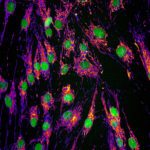Link to Pubmed [PMID] – 23931759
Cell Metab. 2013 Aug;18(2):287-95
Cardiolipin (CL), a mitochondria-specific glycerophospholipid, is required for diverse mitochondrial processes and orchestrates the function of various death-inducing proteins during apoptosis. Here, we identify a complex of the p53-regulated protein TRIAP1 (p53CSV) and PRELI in the mitochondrial intermembrane space (IMS), which ensures the accumulation of CL in mitochondria. TRIAP1/PRELI complexes exert lipid transfer activity in vitro and supply phosphatidic acid (PA) for CL synthesis in the inner membrane. Loss of TRIAP1 or PRELI impairs the accumulation of CL, facilitates the release of cytochrome c, and renders cells vulnerable to apoptosis upon intrinsic and extrinsic stimulation. Survival of TRIAP1- and PRELI-deficient cells is conferred by an excess of exogenously provided phosphatidylglycerol. Our results reveal a p53-dependent cell-survival pathway and highlight the importance of the CL content of mitochondrial membranes in apoptosis.

